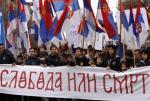
Kurt Volker’s commentary last week about “finishing the job” in the Western Balkans is an important reminder for policymakers not to ignore a volatile region of the world simply because it is not in the headlines. When he visited Washington in February, Serbian Foreign Minister Vuk Jeremic also made the same plea, noting, “[T]he finish line can be seen. But we’re not there quite yet. Unresolved issues must still be addressed, swiftly and without delay, in a candid and forthright manner.”
But I have a problem with Volker’s approach, one that was reiterated on Capitol Hill by Assistant Secretary of State Phil Gordon, namely the attempts to get Serbia, recalcitrant members of the European Union, and key global players like India, Brazil and China to recognize the fait accompli of Kosovo. That’s not going to happen. And without movement on the Kosovo front, there can be no lasting success in the Balkans.
The unilateral declaration of independence sanctioned by Washington and some European capitals back in 2008 did not “solve” the problem. And what pressures or inducements are on offer today to coax countries to recognize? What we need to do is to restart serious negotiation between both sides — with an eye to getting a final settlement that both parties can accept — paving the way for regional integration efforts to move forward.
I think we may have the beginnings of a real peace process—if all sides are prepared to delink two questions that up to this point have always been combined. The first is negotiating over the principle of an independent Kosovo state. If Belgrade and Pristina can agree that the two-state solution is the way forward for both sides, there is no need to walk back the February 2008 declaration. More importantly, Washington — and senior officials on both sides of the aisle in the United States who argued independence was inevitable and irreversible — would not have to be embarrassed by seeming to “give in” and reverse its stance.
But Serbia cannot come to the table if it is being presented with a fait accompli, that the only Kosovo that can be countenanced is the one within its current borders. Territorial adjustments — after all, the current government in Pristina does not control the regions north of the Ibar river anyway — have to be on the table. More creative diplomatic solutions—such as the models presented in the 1929 Lateran treaties between Italy and the Vatican — might need to be employed when considering the Serbian Orthodox heritage sites in other parts of Kosovo.
Encouraging the status quo is only leading to deadlock. Insisting that we only need to wait before Serbia “accepts the inevitable” reminds me of rhetoric we’ve heard for the last fifty years, that we need to give the embargo just a little more time before Fidel Castro falls. Let’s get a process started — instead of consigning Kosovo once again to the freezer.
Nikolas K. Gvosdev [email], an Atlantic Council contributing editor, is on the faculty of the U.S. Naval War College. The views expressed are his own and do not reflect those of the Navy or the U.S. government. AP Photo.
Image: kosovo-freedom-or-death-rally.thumbnail.jpg
